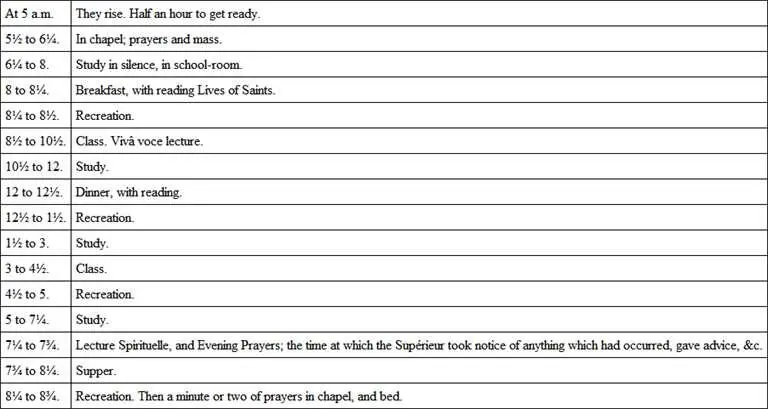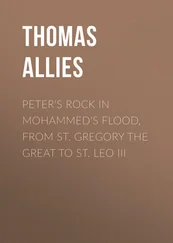Thomas Allies - Journal in France in 1845 and 1848 with Letters from Italy in 1847
Здесь есть возможность читать онлайн «Thomas Allies - Journal in France in 1845 and 1848 with Letters from Italy in 1847» — ознакомительный отрывок электронной книги совершенно бесплатно, а после прочтения отрывка купить полную версию. В некоторых случаях можно слушать аудио, скачать через торрент в формате fb2 и присутствует краткое содержание. Жанр: foreign_antique, foreign_prose, на английском языке. Описание произведения, (предисловие) а так же отзывы посетителей доступны на портале библиотеки ЛибКат.
- Название:Journal in France in 1845 and 1848 with Letters from Italy in 1847
- Автор:
- Жанр:
- Год:неизвестен
- ISBN:нет данных
- Рейтинг книги:4 / 5. Голосов: 1
-
Избранное:Добавить в избранное
- Отзывы:
-
Ваша оценка:
- 80
- 1
- 2
- 3
- 4
- 5
Journal in France in 1845 and 1848 with Letters from Italy in 1847: краткое содержание, описание и аннотация
Предлагаем к чтению аннотацию, описание, краткое содержание или предисловие (зависит от того, что написал сам автор книги «Journal in France in 1845 and 1848 with Letters from Italy in 1847»). Если вы не нашли необходимую информацию о книге — напишите в комментариях, мы постараемся отыскать её.
Journal in France in 1845 and 1848 with Letters from Italy in 1847 — читать онлайн ознакомительный отрывок
Ниже представлен текст книги, разбитый по страницам. Система сохранения места последней прочитанной страницы, позволяет с удобством читать онлайн бесплатно книгу «Journal in France in 1845 and 1848 with Letters from Italy in 1847», без необходимости каждый раз заново искать на чём Вы остановились. Поставьте закладку, и сможете в любой момент перейти на страницу, на которой закончили чтение.
Интервал:
Закладка:
We dined with them at twelve "in the refectory. There was a crucifix at one side, in the middle of the long room; and before it stood the Supérieur while we said grace." – M. ; and we supped with them at seven, in the midst of 180 boys. Absolute silence was kept, and a youth at a tribune in the middle read first a verse or two of the Gospels, and then some of 'Daniel's History of France.' Nothing could be more simple than their dress; the masters were distributed at intervals down the tables. The school was to educate laymen and ecclesiastics together, and they showed with pride a young man who had become priest out of their house, just twelve years after his first communion. This is generally in the twelfth year, but earlier or later according to the state of the individual. They take their first communion after special confession, and before confirmation; we narrowly escaped seeing this sacrament conferred by the archbishop, who had only left two days before. Confession begins at seven according to rule , but generally before that age in fact .

Study commences always with the hymn beginning "Veni Sancte Spiritus," the collect for Pentecost, and "Ave Maria." One half holiday, Thursday. "Afterwards we walked in their little garden and play ground. It being Thursday, the boys went out to walk with some of the clerks. Some, however, remained about the premises, doing some of the painting, &c. that was required. Much of the work has been done by them. They carried all the bricks and mortar while the chapel was building, &c. &c. They seem to be quite a family." – M.
We talked on many subjects respecting the Churches of Rome and England. In their opinion we are utterly heretical and dead. But M. Pierre Labbé, who was chief spokesman, and a very clever talker, admitted, that in case of invincible ignorance, that is, where the person was, with all his endeavours, unable to see that the Church of Rome was the only true Church, (supposing we had the succession, which he more than doubted,) such person might receive the grace of the sacraments. And this he also applied to the Eastern and Russian Churches. He said, if things should ever come to a large, or anything like a national, accession from England to the Roman Catholic faith, the question of Anglican orders must be settled, and the Pope "se gratterait la tête" what to do.
The point we remarked in this school was the intimate terms on which the masters appeared to be with the boys; it was not only that their presence during lesson time served to keep order, but that their influence was everywhere at all times. Confession, doubtless, is the root of this. Thus the Supérieur at catechism gave, as rewards, small pictures, which each boy receiving kissed him on the cheek. There was the greatest hilarity and cheerfulness, mingled with respect, in presence of the master. We left these good people with great admiration of their zeal, and appreciation of their kindness to us. 3 3 It should be mentioned that the two brothers Labbé set up this school some twenty years ago, without any resources, and have maintained it ever since, living upon Providence, gradually building accommodations for their scholars, a chapel, &c.
M. Robert would take us on our way to Caudebec on Friday morning. He conducted us in a cab belonging to the house, for the homeliness of which he apologised. We passed a rich and occasionally diversified corn country to Caudebec, over one of Henri Quatre's battle-fields; there were no signs of it now. I asked him if Louis Philippe had brought about a revolution, or only slipped in to prevent a republic: he replied, "Quand on jette une pierre par la fénêtre, il faut bien qu'elle tombe."
Rouen, June 28. Saturday. – The church of Caudebec is of great beauty, of the 15th century, covered in every part with rich sculpture, especially the western façade, which the Calvinists greatly injured. I went over every part of it with the curé, and up the tower, which is terminated by a curious flêche, something like Strasburgh, formed into crowns, marvellously rich. The height about 180 feet. The view from the top is very striking. The great defect of the interior is that the east end has two windows instead of three, or one, at the apse; the nave is very narrow. There was over the jubé, now removed, a rood with Adam at the bottom of it receiving the Blood in a cup, representing the fallen humanity restored by our Lord. A north and south aisle without transept. Caudebec is in a very pretty situation, within the cleft of the hills, with the river flowing at its feet; on each side rises the wooded amphitheatre formed by the banks of the Seine: there is a plain on the other side of the river; it might serve for the site of a great city. The church is equal to a small cathedral.
The curé has a pleasant presbytère to the north; he treated us with the greatest kindness. The government allows 1000 francs yearly to the restoration of the church; so it goes on bit by bit. There is a remarkable pendant in the Lady Chapel, said to be fourteen feet long: the curé assured me that he had ascertained it was not supported by anything. There is in the chapel to the south a sepulchre with exceedingly rich canopy, and a gigantic figure of Christ, "by which a woman seemed to be praying with great devotion. I can fancy it a great help to meditation." – M.
We set out in an indifferent cabriolet for Rouen by Jumiêges, and St. Georges de Boscherville; a fine road in parts. Jumiêges is a mournful ruin, the nave with its western towers and the arch to the east standing still; the latter of gigantic proportions, the arch being at least eighty feet high, is grievously cracked, and may fall any day. To the east of this little remains; it has been almost entirely carried away, being the most beautiful part of the church, of early or decorated character. To the south are the walls of an elegant decorated chapel of St. Peter; the ruins are covered with brushwood or trees, the arches daily threatening to fall. The garden has a very fine view of the high banks of the Seine; there is a pleasant wilderness. M. Caumont has made himself a very picturesque residence of the old gateway and adjoining buildings. The western façade, with its two towers of equal height and nearly similar form, is very simple but grand. I mounted rather more than 200 steps to the top of the northern: unluckily it had been raining, and there was no sun. It commands the high banks of the Seine for a considerable distance.
St. Georges de Boscherville is indeed a most stately and majestic Norman church, bearing its burden of nearly 800 years as if it had been built yesterday. Its west front, with two stories of three windows, each over a fine recessed door, and turrets of singular beauty and later style, is very imposing. There is a massive central tower with a high spire of Norman, slated, I suppose near 200 feet high. The interior offers all the simple and solemn grandeur of which that style is capable; the one idea is perfectly carried out from top to bottom, as in St. Ouen the Decorated, so here the Norman. I should imagine it to be a perfect model of the style.
We got into Rouen not till after dark Friday night; went to the Hotel de Normandie; not a nice house, dreadfully noisy, being in the street where the two diligences, by the most wondrous evolutions, contrive to worm themselves through the lanes of Rouen into their dens.
Saturday, June 28. – After breakfast M. set off with our letter to the curé of the cathedral, to whom M. Labbé had recommended us. He was going away in the afternoon, but asked us to dine at twelve; this is one of the few fast days in the year out of Lent, and we only agreed to go on condition that he should change nothing of his usual fare. He gave us potage maigre, fish, omelette. He was going to leave Rouen in the afternoon for a few days, so we left very early; and we much regretted this, for I have heard that he enjoys a very high reputation as confessor and spiritual guide.
Читать дальшеИнтервал:
Закладка:
Похожие книги на «Journal in France in 1845 and 1848 with Letters from Italy in 1847»
Представляем Вашему вниманию похожие книги на «Journal in France in 1845 and 1848 with Letters from Italy in 1847» списком для выбора. Мы отобрали схожую по названию и смыслу литературу в надежде предоставить читателям больше вариантов отыскать новые, интересные, ещё непрочитанные произведения.
Обсуждение, отзывы о книге «Journal in France in 1845 and 1848 with Letters from Italy in 1847» и просто собственные мнения читателей. Оставьте ваши комментарии, напишите, что Вы думаете о произведении, его смысле или главных героях. Укажите что конкретно понравилось, а что нет, и почему Вы так считаете.












